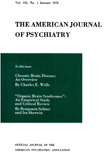THERAPEUTIC INTERVIEWING OF HOSTILE RELATIVES
Abstract
It has been pointed out that hostility demonstrated toward an institution is frequently seen to be not a true hostility toward the hospital, but a displacement or projection of hostility toward the relative currently hospitalized. When this hostility toward a relative can be verbalized the relationship between the hospital and the relative is much improved. This is a matter of satisfaction to both the doctor and the relative in question. However, this is only a minor point. When a relative has verbalized his hostile feelings about a patient, and thus becomes aware of them, he is able to make a better adjustment with the patient in the home after discharge. It may be speculated that this better adjustment will be a strong factor in making for a favorable prognosis. In cases where it had been impossible to get a relative to express hostility, it did not necessarily follow that hostility did not exist. It is believed that the relative in such a situation is demonstrating his own emotional maladjustment. In spite of the overconcern expressed by this type of relative, it is felt that when the patient returns home to such a situation the prognosis is poorer, inasmuch as there is no understanding of the interpersonal relationships involved.
The dynamics of the development of hostility have not been discussed as space does not permit. The fact is that we are not so concerned with the development of hostility as with the mechanisms of displacement and projection. Hostility is dissipated by its being brought into awareness. The relative at first is quite surprised, dislikes what he sees in himself, and does what he can to adjust himself better to the patient. Often this is adequate to ensure an improved adjustment in living. It is emphasized that verbalization of hostility toward the patient is not the only cause for an improvement in relations with relatives. However, this study includes only hostile relatives who did not respond to the ordinary methods of reassurance. The effort and time consumed in dealing with hostile relatives is decidedly worth while. Relatives should be interviewed whenever possible and a sincere attempt made to get them to discuss their feelings toward the patient. This therapeutic interviewing should be considered a definite part of the patient's treatment program whenever possible.
Access content
To read the fulltext, please use one of the options below to sign in or purchase access.- Personal login
- Institutional Login
- Sign in via OpenAthens
- Register for access
-
Please login/register if you wish to pair your device and check access availability.
Not a subscriber?
PsychiatryOnline subscription options offer access to the DSM-5 library, books, journals, CME, and patient resources. This all-in-one virtual library provides psychiatrists and mental health professionals with key resources for diagnosis, treatment, research, and professional development.
Need more help? PsychiatryOnline Customer Service may be reached by emailing [email protected] or by calling 800-368-5777 (in the U.S.) or 703-907-7322 (outside the U.S.).



